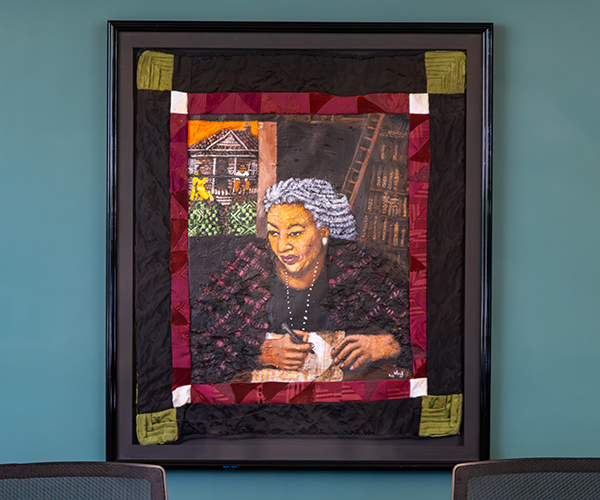Behind the doors of Grande Pavilion rehabilitation home, 90-year-old poet Russell Atkins — once a friend of Langston Hughes and Marianne Moore — watches a talk show. When I call his name, he pulls himself up in his wheelchair, adjusts the gray tufts of hair and invites me in — as if he’d always been waiting.
“Well,” he says, “I don’t have much to say. I’m at the end. Ninety years old.”
But even now, his pen is still flowing, crafting four new poems for a book, In the Company of Russell Atkins, released last month. It includes works by generations of poets influenced by Atkins: Hzal Anubewei (one of the original Muntu Poets taught by Atkins in the 1960s), Kevin Prufer, RA Washington and many others.
During high school, Atkins was turned on to poetry by Percy Bysshe Shelley, John Milton and William Wordsworth. After a librarian invited Langston Hughes to do a reading at the school, Atkins began corresponding with the Harlem Renaissance poet. Before he was 20, thanks to the encouragement of Hughes, Atkins was published in View — “a literary magazine, not the women’s television program,” he quips.
In 1950, he co-founded Free Lance magazine, a literary journal, and over the years he published little abstract poetry collections, including Here in The (Cleveland State University Poetry Center, 1976). His poems were reprinted in 20 anthologies.
Influenced by music and compared to John Coltrane, Atkins’ poems are as much about the music of language as they are about the everyday world: waiting at the bus stop, watching a once-beautiful bartender or standing by Lake Erie.
Although he also wrote at least two operas and spirituals for piano and always thought of himself as a musician as much as a poet, he’d seen friends struggle to get music produced.
When I asked him to read aloud his “Night and a Distant Church,” it was like watching a film of wind:
Forward abrupt up
then mmm mm
wind mmm m
mmm m
upon
the mm mmm
wind mmm m
mmm
into the mm wind
rain now and again
the mm wind
bells
bells
He kept publishing throughout the ‘80s and then retreated from public view to provide care for his aunt Mae. “There always was a contest between trying to survive and practicing the arts,” he says.
With the publication of Russell Atkins: On the Life & Work of an American Master (Pleiades Press, 2013), Atkins’ work reached a new generation of poets.
“I was amazed at first by the virtuosic music that lives in his poems,” says co-editor Kevin Prufer, “then by his very sly wit, verbal dexterity and truly inventive dictions.”
Now In the Company of Russell Atkins (Red Giant Books, 2016), edited by Diane Kendig and Robert McDonough, celebrates the legacy of the unsung master.
“Atkins’ work inspires me to break the rules in the name of creating what feels right, one poem at a time,” says contributor Mary Weems. “His poems are like mysteries I never seem to completely figure out.”
In the nursing home, Atkins asks a handyman to attach his fallen, dead clock back to the wall. The man hammers it, and time ticks again. His most recent poem — inspired by a visit from Kendig about the anthology — captures the strange sadness of life in the nursing home. As I leave, I say that I hope to see new poems from him soon. He says, “I hope so too.”




